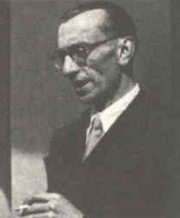You can help expand this article with text translated from the corresponding article in Italian. (May 2015) Click for important translation instructions.
|

Federico Chabod (Italian: [fedeˈriːko ʃʃaˈbo]; February 23, 1901 – July 14, 1960), also referred to as Frédéric Chabod (French: [fʁedeʁik ʃabo]), was an Italian historian and politician.
Biography
Born in Aosta from notary Laurent Chabod, from Valsavarenche, and Giuseppina Baratono, from Ivrea, he studied at the University of Turin under Pietro Egidi and Gaetano Salvemini, writing his thesis on Machiavelli. His thesis was published with the title of Introduzione al Principe in 1924. After graduating from the University of Turin, he continued his studies, this time at the University of Berlin under Friedrich Meinecke. He began his academic career at the University of Perugia and the University of Milan. In 1946, he was hired by the University of Rome to head the Istituto Italiano per gli Studi Storici founded by Benedetto Croce. He is best known for expanding Italian historiography from its traditional insularity by linking it in a broader, European context.
Chabod died at Rome in 1960.
Works
- L'Italia contemporanea
- L'Historiographie de l'Italie contemporaine
- De Machiavel à Benedetto Croce: études présentées
- Histoire de l'idée d'Europe
- Storia della politica estera italiana dal 1870 al 1896, 1951. English trans. 1996.
- Lezioni di metodo storico
- Scritti su Machiavelli
- Scritti sul Rinascimento
- Il ducato di Milano e l'impero di Carlo V
- Lo Stato e la vita religiosa a Milano nell'epoca di Carlo V
- Storia di Milano nell'epoca di Carlo V
- Carlo V e il suo impero
- Storia dell'idea d'Europa
- Idea di Europa e politica dell'equilibro
- L'idea di nazione
References
- Due to the bilingual status of Aosta Valley: Frédéric Chabod, La création des régions autonomes à statut spécial en Italie
- Maturi, Walter. "Federico Chabod : Historian if Italian Foreign Policy" . In Chabod, Federico; Italian Foreign Policy: The Statecraft of the Founders, 1870-1896, p. xvii, Princeton University Press, 2014. https://doi.org/10.1515/9781400864225.xxvii
- Chabod, Federico. Italian Foreign Policy: The Statecraft of the Founders, 1870-1896. books.google.com
External links
- Conseil de la Vallée (Aosta Valley Regional Council) (in French and Italian)
Further reading
- Boyd, Kelly, ed. Encyclopedia of historians and historical writing. Vol. 1 (Taylor & Francis, 1999) pp 192–94.
- Braudel, Fernand. "Federico Chabod (1901-1960)." Annales. Histoire, Sciences Sociales 16#1 (1961). pp 1–2.
- Vigezzi, Brunello (ed.), Federico. Chabod e la Nuova Storiografia italiana dal primo al secondo dopoguerra, 1919–1950. Edizioni Universitarie Jaca, 1983, pp. xxiii, 719.